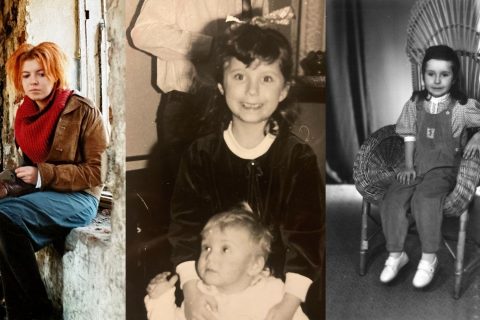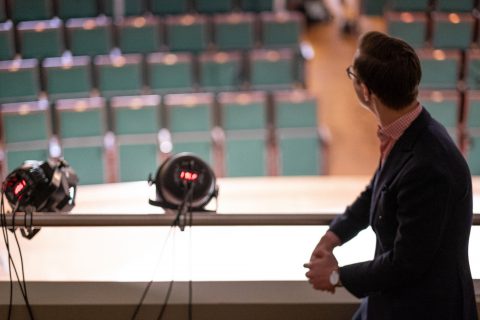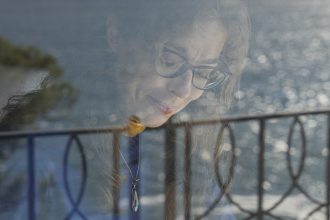A decade ago, three Kaunas artists – Vaiva Grainytė, Lina Lapelytė and Rugilė Barzdžiukaitė – presented themselves for the first time laconically but loudly with their opera Have a Good Day! that speaks of the lives of supermarket cashiers—Word, sound, and image. In 2019, these three surnames flashed in the media (not only in the cultural one) worldwide. The Golden Lion at the Venice Biennial given to opera/performance Sun and Sea (Marina) is probably the highest achievement of Lithuanian art abroad. Creators who have already been encouraged by many prizes before, soon after, were awarded the most important prize in their homeland. However, we will get back to medals after we find out what was Vaiva, Lina, and Rugilė’s – they all have their individual artistic careers, but this time, we are talking about them as a trio – teenage Kaunas like. After all, everything begins after school, right?

The Kaunas phase in your life. You grew up at the same time. Did you meet then? Where?
Vaiva: The 90s in Kaunas was a good environment to grow and develop as a person. It was, in a sense, the golden age. The experimental music scene was very active, and it was strongly affecting me. I could mention Ramūnas Jaras’ Sumirimas Festival, which later turned into Didelis pasaulis! (you can read the interview with R. Jaras in Kaunas Full of Culture April issue of 2020, ed.) or Friday events curated by Raimundas Eimontas at the Aura Dance Theatre. Concerts were the weirdest. I lived in the Old Town myself, went to Kaunas Jesuit Gymnasium. So, on Fridays after school, I would fold my uniform, stuff it in my backpack and pass by Langas Gallery… It hosted the most exciting concerts too; you could find Tango magazines on the floor. These magazines opened up a meaningful world, which resonated with the developing personality.
Lina: Vaiva listed the moments that were important for me too. Both Langas and Tango, which at the time provided access to John Cage’s texts, articles on Laurie Anderson, La Monte Young, and other artists. For me, a J. Naujalis Music Gymnasium student, where everything revolved around classical music, this was a whole different world. Of course, there were concerts at the Philharmonic, the Drama Theatre, Aura Contemporary Dance Festival, and Kaunas Jazz. I think I may have started volunteering in the latter when I was 12 years old. I did not miss a single concert and met such performers as Jimi Tenor. At the Didelis pasaulis! Festival I heard Gintas K’s experiments. Those were critical experiences; I took notes on every concert. I don’t remember where I met Vaiva, perhaps in a Hare Krishna temple. Or was it in Suflerio būdelė?
Rugilė: My trajectories were a bit different. Mine and Vaiva’s paths crossed in a photography school led by Romas Juškelis. It was an important phase of my life. I spent many years at Antanas Martinaitis Art School. There were important teachers and dear friends at the VMU Rasa Gymnasium, which I graduated from. I was more introverted, I didn’t go to music events so much, but I followed what was happening in theatres, cinemas; I spent many nights painting, watching the roofs of Kaunas, and the like.
Was the opera Have a Good Day!, which premiered a decade ago, your first work together?
Vaiva: Yes, the first one. As Rugilė mentioned, Lina and I saw each other at the concerts more, and Rugilė and I would meet at photography school. We all met (but not directly) at the Lithuanian Academy of Music and Theater, where we studied different subjects (L. Lapelytė studied violin, R. Barzdžiukaitė studied cinematography and artistic direction, and V. Grainytė studied theatre and art history, ed.). We were united as creators by Have a Good Day!
Two years have passed after the Venice Biennial, where your work Sun and Sea received the highest award – Golden Lion. The life of the opera continues. How do you feel about it? Perhaps you would like to let it go, or will it always be part of you? How does the work mutate depending on location and, of course, the pandemic?
Rugilė: Well, now everything has come to a halt. We are waiting for the tours to continue. After Venice, we did three tours, which helped us see what it means to build everything from scratch in a different place, what it means when there are volunteers and how to behave when there are none. Currently, we are figuring out how things will continue; we cannot let it go.
Vaiva: The tours may not be happening, but the process is taking place. We have maybe thirteen WhatsApp chats on different topics; the phone is beeping all day. We are like the co-owners of the troupe, the opera’s mechanism (along with other members of the team). We are planning something that may not happen, but schedules and trips need to be organised. I seem to have detached myself creatively from this work, I am directing my energy elsewhere, but in an earthly sense, it is like a workplace.
Lina: It is true, it seems like we never had any respite after Venice. We are constantly asked questions, for example, if it’s possible to use pebbles instead of sand. Does the sad have to be yellow or maybe it can be black? You feel responsible, although it seems that the work could just travel on its own. Even if we wanted to distance ourselves, it seems that Sun and Sea has become part of our identity, our business card. Sometimes it helps but also adds responsibility.

Do you think that Sun and Sea and its success was fully perceived in Lithuania?
Lina: Indeed, it was. Even now, I meet people who share their impressions and emotions they felt when they learned about us winning. The victory does not really belong to us three; it goes out to the whole art community in Lithuania, which is unique and special, starting with Jonas Mekas, Fluxus. All of these currents are intertwined and definitely influenced us. The mere fact that it was us who went to Venice shows a very open attitude towards artists and their work. We all raised the lion together.
Rugilė: I think our strength lies in the fact that we do not associate ourselves with only one context or one community, be it theatre, music, or contemporary art. The hybridity of the work allows us to remain fluid instead of identifying with a particular group.
An interesting choice of genre. Is Sun and Sea a natural extension of Have a Good Day! or was there a debate about the form of the artwork?
Lina: Opera allows you to draw influence from literature, music, visual arts. The gesamtkunstwerk is a total work of art, a construct that we have created by combining each of our different practices.
Vaiva: Yes, and working on the first project, opera seemed like the best genre for the three of us to meet and unite our competencies. When we were developing Sun and Sea and preparing it for the Venice Biennial, which is all about contemporary art, and thinking that we are not really creating a theatrical format here (the piece went on without breaks, from morning till evening, for 8 hours twice a week), we added the word “performance” next to the opera. It’s a paradoxical combination – the genres seem to contradict each other. Opera seems quite conventional, and performance points to the domain of contemporary art.
Did the Gold Lion inspire or make you feel more responsible? Perhaps you saw your work through the eyes of other people?
Vaiva: It was a crazy time: euphoria, tiredness and, of course, responsibility. The victory caused a huge stir and generated flows of people into the pavilion. That had to be controlled. In truth, Lina and Rugilė spent more time in Venice.
Rugilė: I think from a time perspective, the impact that the lion had on us is twofold – it brought both inspiration and tension. In the context of my solo work, I feel that those around me find it easier to trust my other ideas. As a trio, we are invited by various institutions. When we just started, we had to fight for that attention, and now the doors are wide open, organisations are fighting between themselves, which one is going to show Sun and Sea, they are talking us into creating a new project. On the other hand, it is clear that the past success was driven by acting with strong motivation, inspired by specific ideas rather than a plethora of invitations, so it is important not to step on this rake of success.
Lina: It allowed us to choose. You can choose to no longer create! When everything came to a halt, meanings and needs shifted along with the attitude towards myself as an artist and what I do here.

Compared to the most winners, you were evaluated with the National Culture and Art Prize quite early in life. How does it feel? Does it mean you can do whatever you want or, as Lina said, not to do anything? Or maybe, on the contrary, you want to give more to Lithuania?
Lina: Both with Have a Good Day! and Sun and Sea, we thought about the local and the global context. If the work is valuable, it will find its viewer everywhere, so we really never tried to please Lithuania specifically.
Vaiva: Sometimes, you read about an artist, and you find something like a stamp on their biography – winner of the National Culture and Art Prize. It is usually a man in his sixties. This kind of recognition is like a halo. It had recently dawned on me; I am also a laureate! An interesting Fluxus-kind of feeling.
And the responsibility to Lithuania? I think if we constantly thought about this question, it would cause tension, our work would not be natural. Our minds seem to work well, we did not become conceited, the prize did not overwhelm us.
Is there a chance to see Sun and Sea in Kaunas, well, ok, Vilnius? Or is this a financially absurd idea after all?
Rugilė: We are preparing for it. As soon as possible, let’s hope this year! As Vilnius City Municipality was the sponsor of the pavilion at the Venice Biennial, it has priority. We really want to show it in Kaunas too, but, of course, it is easier for Kaunas residents to travel to Vilnius than to transport the entire installation to Kaunas. Well, sooner or later… The work will stay alive, we are thinking about the prospect of two years or more.
Vaiva: One of those WhatsApp chats is about Vilnius.
Many people of our generation are very global. After all, us growing up and joining the EU came about at the same time, many opportunities have opened up. You also travel a lot, enter residency programs, teach, perform. What do you lack in Lithuania after the experiences abroad?
Lina: There’s always something missing. For example, old trees in cities, a sensitive approach to architecture, planning of public places. In order to get a mediocre result quickly, we do a lot of irreparable damage… These topics make me sad. However, these issues are the same or similar everywhere. Perhaps these processes only take place at different periods. When you leave and then return, you can bring knowledge and a different viewpoint. We are not leaving because we feel bad here. It’s just that after broadening your horizon, you can see more clearly what you should be striving for and which scenario you would not want.
Rugilė: While studying in London, for a while, I lived on a street where trees were cemented up to the trunks, and their branches hung like they were sick. So, there are places where things are even worse. There I realised that a big city is not suitable for me as a long-term place of residence. To be there for inspiration for a few months? All good, but no more than that.
What are you listening to?
Vaiva: I was a real music lover but now, I have to admit, I don’t listen to music at all. I follow the information, I listen to the news, podcasts… I don’t know why; maybe I have listened enough? Maybe because I work intensively with texts, I rest my ears with the sounds of nature and silence.
Rugilė: I’m not specifically looking for music either. I hear something by chance, and I get pleasantly surprised. I get hooked and return to it but do not remember names. And what about you, Lina?
Lina: [laughs] Same here – I listen to the sounds of the environment. Maybe music is too strong an experience for me to be a part of everyday life. Project Beautiful and That Powerful One (Graži ir ta galinga) left an impression on me. I liked the use of the dialect in pop culture. Also, the name that was suggested by Raimundas Malašauskas, which I memorized and keep coming back to, is Moses Sumney.
Are you friends or colleagues?
Lina: I think friends. And that friendship is very deep. Like a marriage that contains love, friendship, care for common children (creations), and moments of emancipation. We have a strong connection, which I cherish more than our success.
Vaiva: Of course. Only recently, there are too many things going on, we are physically separated by quarantine. All the questions are work-related. So now I don’t know that well what is happening in Lina and Rugilė’s lives.
Rugilė: Our friendship is pulsating. It was different when we did not know each other very closely but rather intuitively. This was during the Have a Good Day! period. It is different now that we have gone through fire and water and know the edges of our personalities. We really feel and hear each other.




